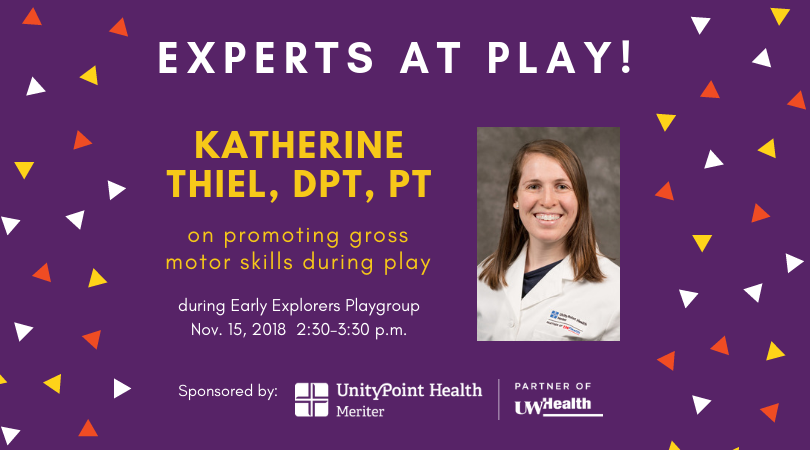- Home Test 625
- Home
- Visit
- Exhibits
- Programs & Events
- Membership
- Support
- Give the Gift of Play
- About
- Checkout
- Cart
- Utility
- Birthday Party Cancellation Form
- Phone Call
- Request for a Facility Rental Agreement
- Privacy Policy
- American Girl Benefit Sale
- Party Catering Form
- Event Date Request Form
- Camp Food Orders
- Flourish!
- IA24 Evening Event RSVP
- Development Events RSVP
- Development Tour
- Folder Request Form
- Development Team Test Page
- Logout
- Birthday Parties
Museums and Pediatricians issue a joint “Prescription for Play”
 Madison Children’s Museum joins our fellow children’s museums, pediatricians, and health care providers across Wisconsin to issue a joint call: Let the children play!
Madison Children’s Museum joins our fellow children’s museums, pediatricians, and health care providers across Wisconsin to issue a joint call: Let the children play!
Late last summer, the American Academy of Pediatrics released a clinical report, The Power of Play: A Pediatric Role in Enhancing Development in Young Children, highlighting the numerous benefits that play provides for children. The report urges doctors to intervene to “prescribe play” to children everywhere.
As parents look for safe and supported ways to include play in their children’s lives, Wisconsin’s children’s museums are eager to help. Wisconsin has more children’s museums per capita than any other state in the country, with fifteen museums in communities across the state.
To emphasize the connection between the importance of play and the resources that Wisconsin’s children’s museums offer, we are partnering with local pediatricians and health care providers. Collectively they are issuing a “Prescription for Play” to all Wisconsin children. This is out ahead of the upcoming nationwide call for a Prescription for Play from the Association of Children’s Museums in a webinar on November 19.
“As a pediatrician and a parent, I understand just how important play is for a child’s development. It’s why our organization is so proud to partner with Madison Children’s Museum on their First-Time Parent Membership program. It’s also why we support the Wisconsin Children’s Museums and the Association of Children’s Museums’ Prescription for Play and their efforts to help children learn and grow.”
—Dr. Carleen Hanson, Pediatrician at UnityPoint Health – Meriter
For the past year, Madison Children’s Museum has worked closely with our local healthcare providers on a number of initiatives designed to bring the benefits of play to all children—and especially our communities’ newest families and youngest babies—through our groundbreaking First-Time Parent Membership program.
Watch what Dr. Dipesh Navsaria, MPH, MSLIS, MD has to say in this overview of the first year of the program:
[youtube https://www.youtube.com/watch?v=5q6q_IOZ3lU?start=68&w=560&h=315]
Complementing the First-Time Parent Membership program, Madison Children’s Museum brings local health care providers into the museum for our Experts at Play series. Healthcare providers from Unity Point – Meriter visit the museum’s regular playgroup for small children. Sitting on the floor with babies and their parents, they give a very short presentation about themselves and their work and then open the floor for an informal discussion and Q & A on a topic of interest to parents. Our next Experts at Play is on November 15 at 2:30 p.m.; Dr. Katherine Thiel, DPT, PD from Unity Point – Meriter will talk with parents and caregivers about promoting gross motor skills during play.

Wisconsin’s initiative is part of a growing national conversation about the importance of play. On November 19, 4 p.m. (CST), the national Association of Children’s Museums is hosting a public “Prescription for Play” webinar for both parents and children’s museum staff to talk with the authors of the American Academy of Pediatrics report and highlight how children’s museum are already championing these recommendations in our communities. The webinar is open and free for all who register. A recording of the webinar will be publicly available and widely shared.
Every parent wants the best possible start in life for their child. Every community wants their children to grow up to be healthy, happy, productive citizens. If there were a drug or supplement that could boost children’s social-emotional, cognitive, language, and self-regulation skills, then everyone would demand it for their children; yet all of these benefits are readily available from the simple act of play.
Even as science is showing how critical open-ended play is to children’s mental, physical and social development, playtime is being squeezed out of children’s schedules to make room for more instruction—or even in favor of screen time. Many children also lack safe places to play. Children’s museums provide the safe, creative play places that Wisconsin’s families need for their children.
